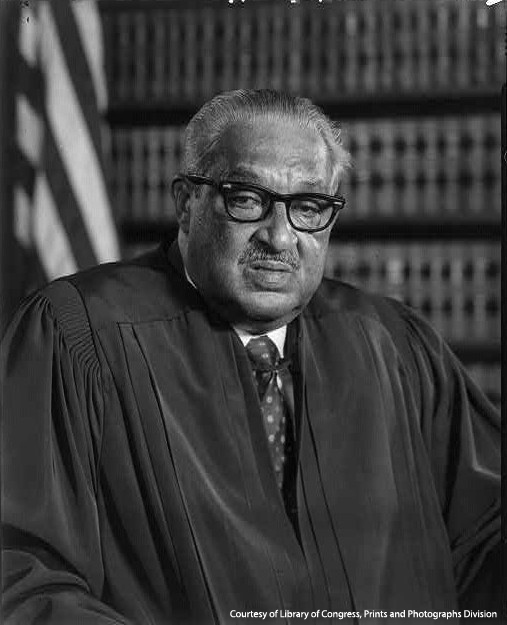Leadership Gallery
Thurgood Marshall, 1908-1993
Thurgood Marshall is best known as the Supreme Court Justice and early advocate for pressing the nation’s courts in matters of civil rights. He was also a lifelong Episcopalian. Born in 1908 in Baltimore, Maryland, to a Pullman car porter and a schoolteacher, Marshall was the grandson of a freed slave. He attended Baltimore public schools and then the historically black Lincoln University in Pennsylvania. In 1930 he applied to the University of Maryland Law School but was denied admission due to his race. The indignity of this event would influence his future professional life. After graduating first in his class and receiving his law degree from Howard University, Marshall successfully sued the University, resulting in the admittance of minority students.
In 1936 Charles Hamilton Houston, former Howard Law School dean and chief counsel for the National Association for the Advancement of Colored People (NAACP), called Marshall to be his deputy in New York. Four years later, Marshall was appointed the first director of the Legal Defense Fund, dedicated to civil rights advocacy and litigation. In 1954 as chief counsel for NAACP, he argued and won the landmark Brown vs. Board of Education case before the Supreme Court. The decision refuted the idea of “separate but equal” public schools and was one of the many challenges to state-sponsored discrimination that Marshall argued and won. He devoted thirty years traveling the South fighting for the rights of America's oppressed minority on behalf of the NAACP’s Legal Defense and Educational Fund before his appointment by John F. Kennedy to the U.S. Court of Appeals for the Second Circuit in 1961. In this capacity, he wrote over 150 decisions including support for the rights of immigrants, limiting government intrusion in cases involving illegal search and seizure, double jeopardy, and right to privacy issues.
Marshall was elevated to the post of Solicitor General of the United States four years later by President Lyndon Johnson. Before his subsequent appointment as Supreme Court Justice in 1967, he won 14 of the 19 cases he argued before the nation’s highest court. He was the first African American to hold either position and served for 24 years on the Court, retiring in 1991.
Upon Marshall’s arrival to New York City in 1938, he became a very active member of St. Philip’s Church in Harlem, serving on the Vestry and as Senior Warden and Deputy to the 1964 General Convention. In 1965 the Marshall family moved to Washington, DC and joined St. Augustine’s Church. As a devoted Episcopalian, Marshall was also an ardent believer in the separation of church and state. Consequently, Marshall attended Church infrequently after his appointment as Supreme Court Justice, concerned that he would develop biased political views which would influence his judgement. His faith was revealed in his work, however, as he sought justice for all.
Deputies to the Diocese of Washington's annual convention voted to submit a resolution at the 2006 General Convention requesting inclusion of Thurgood Marshall in the Church's book of Lesser Feasts and Fasts. In written testimonies accompanying the resolution, a priest of Marshall's former parish stated that, "The Spirit working through this man gave him an intuitive sense of justice in which he saw all of life as sacred and all persons equal before God."


